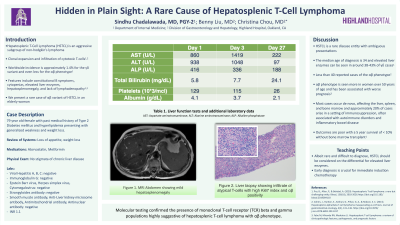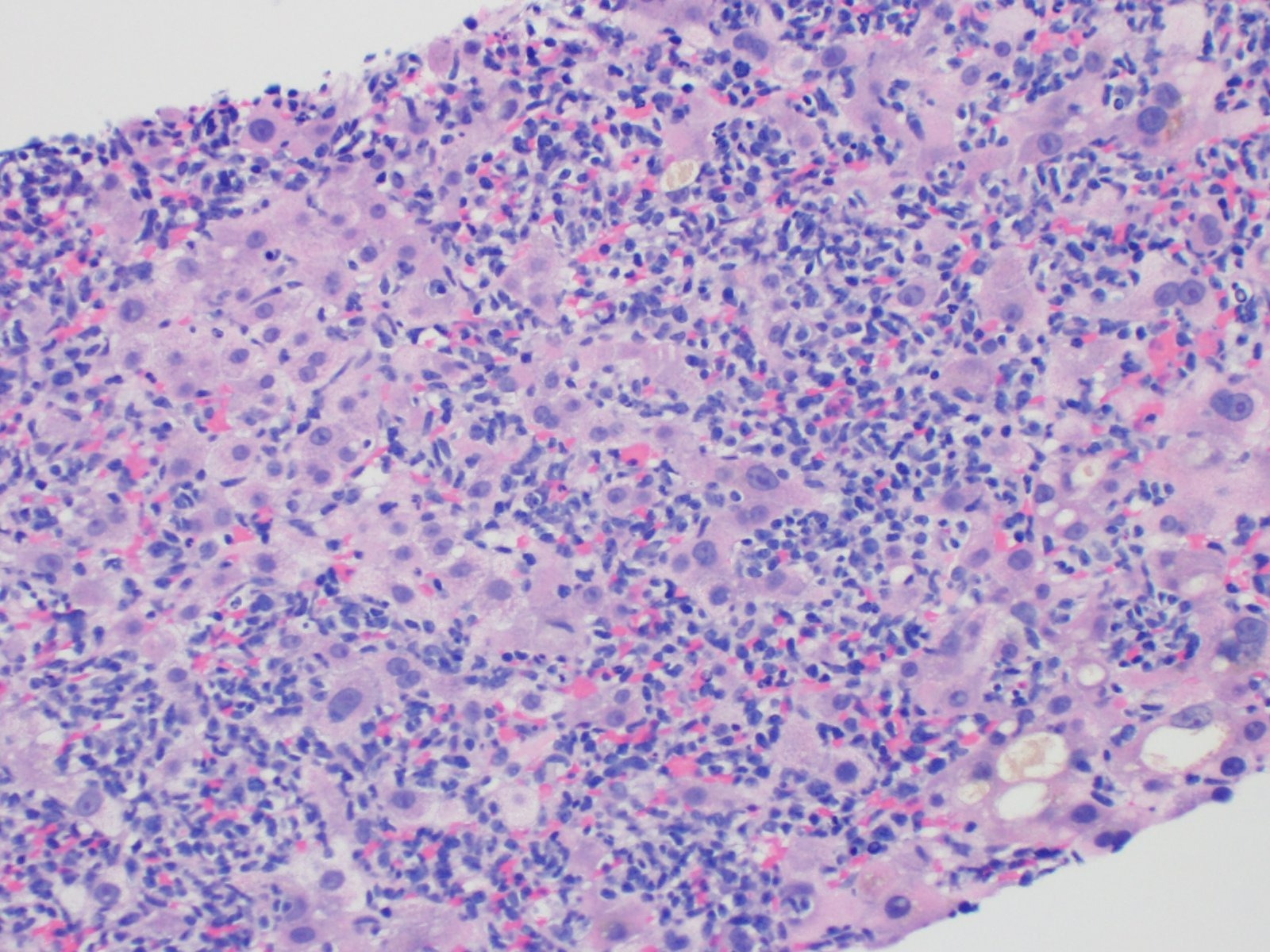Back


Poster Session B - Monday Morning
Category: Liver
B0601 - Hidden in Plain Sight: A Rare Case of Hepatosplenic T-Cell Lymphoma
Monday, October 24, 2022
10:00 AM – 12:00 PM ET
Location: Crown Ballroom

Has Audio

Sindhu Chadalawada, MD
Alameda Health System - Highland Hospital
Oakland, CA
Presenting Author(s)
Sindhu Chadalawada, MD1, Benny Liu, MD1, Christina Chou, MD2
1Alameda Health System - Highland Hospital, Oakland, CA; 2Alameda Health System – Highland Hospital, Oakland, CA
Introduction: Hepatosplenic T-cell lymphoma (HSTCL) is a highly aggressive subgroup of non-Hodgkin's lymphomas affecting 1.4% of the world's population. It is characterized by clonal expansion and infiltration of cytotoxic γδ T-cells typically in young male adults, presenting with constitutional B symptoms, cytopenias, elevated liver enzymes, hepatosplenomegaly, and lack of lymphadenopathy. We present a rare case of an αβ variant of HSTCL in an elderly woman.
Case Description/Methods: A 79-year-old female with type 2 diabetes mellitus and hyperlipidemia presented with generalized weakness and weight loss. Home medications included atorvastatin and metformin. Physical exam did not show stigmata of chronic liver disease. Initial laboratory work-up was notable for aspartate aminotransaminase (AST) 860 U/L, alanine aminotransaminase (ALT) 938 U/L, alkaline phosphatase (ALP) 416 U/L, total bilirubin 5.8 mg/dl with a direct predominance, international normalized ratio (INR) 1.1, albumin 4.1 g/dL, and platelets 129 10*3/mcL. Serologic workup was negative for common and rare viral hepatitis, autoimmune, toxic and metabolic etiologies. MRI abdomen with magnetic resonance cholangiopancreatography (MRCP) revealed patent hepatic vasculature with mild hepatosplenomegaly. Liver enzymes continued to worsen, with a peak AST 1419 U/L, ALT 1048 U/L, and total bilirubin 24.5 mg/dl. Liver biopsy revealed an atypical T-cell infiltrate with a high Ki-67 index negative for CD56 and CD5. Immunohistochemistry showed alpha beta positivity (Figure 1). Molecular testing confirmed the presence of monoclonal T-cell receptor (TCR) beta and gamma populations highly suggestive of hepatosplenic T-cell lymphoma with αβ phenotype.
Discussion: Since its discovery in 1990, only several hundred cases have been described for the γδ variant of HSTCL and less than 40 cases have been reported for the αβ variant. The median age of diagnosis is 34 for γδ cases. The αβ variant can be seen in women over 50 years of age and has been associated with worse prognosis. Most cases occur de novo. Approximately 20% of cases arise in a setting of immunosuppression, often associated with autoimmune disorders and inflammatory bowel disease. Outcomes are poor with a 5-year-suvival of < 10% without bone marrow transplant. Albeit rare and difficult to diagnose, HSTCL should be considered in the differential for elevated liver enzymes, as early diagnosis is crucial for imminent induction chemotherapy.

Disclosures:
Sindhu Chadalawada, MD1, Benny Liu, MD1, Christina Chou, MD2. B0601 - Hidden in Plain Sight: A Rare Case of Hepatosplenic T-Cell Lymphoma, ACG 2022 Annual Scientific Meeting Abstracts. Charlotte, NC: American College of Gastroenterology.
1Alameda Health System - Highland Hospital, Oakland, CA; 2Alameda Health System – Highland Hospital, Oakland, CA
Introduction: Hepatosplenic T-cell lymphoma (HSTCL) is a highly aggressive subgroup of non-Hodgkin's lymphomas affecting 1.4% of the world's population. It is characterized by clonal expansion and infiltration of cytotoxic γδ T-cells typically in young male adults, presenting with constitutional B symptoms, cytopenias, elevated liver enzymes, hepatosplenomegaly, and lack of lymphadenopathy. We present a rare case of an αβ variant of HSTCL in an elderly woman.
Case Description/Methods: A 79-year-old female with type 2 diabetes mellitus and hyperlipidemia presented with generalized weakness and weight loss. Home medications included atorvastatin and metformin. Physical exam did not show stigmata of chronic liver disease. Initial laboratory work-up was notable for aspartate aminotransaminase (AST) 860 U/L, alanine aminotransaminase (ALT) 938 U/L, alkaline phosphatase (ALP) 416 U/L, total bilirubin 5.8 mg/dl with a direct predominance, international normalized ratio (INR) 1.1, albumin 4.1 g/dL, and platelets 129 10*3/mcL. Serologic workup was negative for common and rare viral hepatitis, autoimmune, toxic and metabolic etiologies. MRI abdomen with magnetic resonance cholangiopancreatography (MRCP) revealed patent hepatic vasculature with mild hepatosplenomegaly. Liver enzymes continued to worsen, with a peak AST 1419 U/L, ALT 1048 U/L, and total bilirubin 24.5 mg/dl. Liver biopsy revealed an atypical T-cell infiltrate with a high Ki-67 index negative for CD56 and CD5. Immunohistochemistry showed alpha beta positivity (Figure 1). Molecular testing confirmed the presence of monoclonal T-cell receptor (TCR) beta and gamma populations highly suggestive of hepatosplenic T-cell lymphoma with αβ phenotype.
Discussion: Since its discovery in 1990, only several hundred cases have been described for the γδ variant of HSTCL and less than 40 cases have been reported for the αβ variant. The median age of diagnosis is 34 for γδ cases. The αβ variant can be seen in women over 50 years of age and has been associated with worse prognosis. Most cases occur de novo. Approximately 20% of cases arise in a setting of immunosuppression, often associated with autoimmune disorders and inflammatory bowel disease. Outcomes are poor with a 5-year-suvival of < 10% without bone marrow transplant. Albeit rare and difficult to diagnose, HSTCL should be considered in the differential for elevated liver enzymes, as early diagnosis is crucial for imminent induction chemotherapy.

Figure: Figure 1. Liver biopsy showing infiltrate of atypical T-cells with high Ki67 index and αβ positivity
Disclosures:
Sindhu Chadalawada indicated no relevant financial relationships.
Benny Liu indicated no relevant financial relationships.
Christina Chou indicated no relevant financial relationships.
Sindhu Chadalawada, MD1, Benny Liu, MD1, Christina Chou, MD2. B0601 - Hidden in Plain Sight: A Rare Case of Hepatosplenic T-Cell Lymphoma, ACG 2022 Annual Scientific Meeting Abstracts. Charlotte, NC: American College of Gastroenterology.
